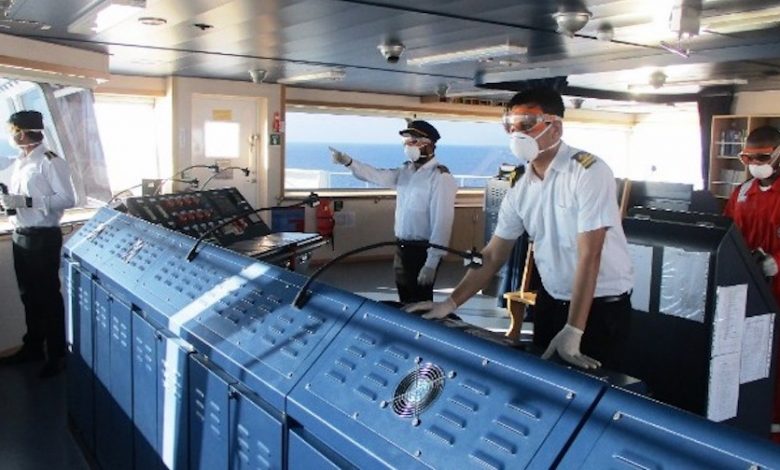Maritime stakeholder initiative launches to resolve the crew change crisis

More than 300 companies and organisations have joined forces to help resolve the crew change crisis.
The Neptune Declaration on Seafarer Wellbeing and Crew Change is a global call to action to address the ongoing crew change crisis caused by the Covid-19 pandemic. It focuses on concrete actions that can facilitate crew changes and keep vital global supply chains functioning. The maritime stakeholder initiative was developed by the Maritime Industry Crew Change Taskforce created by the Global Maritime Forum. The taskforce is chaired by Jeremy Nixon, CEO of Ocean Networks Express (ONE), and Graham Westgarth, chairman of V. Group, and brings together representatives of companies from across the maritime value chain as well as organisations including ICS, ITF, International Maritime Employers’ Council, the Global Maritime Forum and the World Economic Forum.
Crew change crisis is shipping’s largest ever humanitarian and logistical tragedy
“We are witnessing a humanitarian crisis at sea. Throughout the coronavirus pandemic, seafarers have kept the world supplied with food, energy and other vital goods, with no line of sight of when to go home to their families. They have become hostage of the situation and unable to disembark from their ships. Yet, we can put an end to the crew change crisis without any risk to the general public health,” commented ONE’s Nixon.
To address the crisis, the declaration defines four main actions:
- Recognise seafarers as key workers and treat them accordingly by giving them early access to Covid-19 vaccinations
- Implement high quality health protocols
- Increase collaboration between ship operators and charters to facilitate crew changes
- Ensure airline connectivity between key maritime hubs
“The crew change crisis is the largest ever humanitarian and logistical tragedy facing the maritime sector”, said Hugo De Stoop, CEO of Belgian tanker giant, Euronav. “It is our responsibility and duty towards the seafarers, and their families, to globally address this crisis as one voice. The maritime industry has stayed under the radar too long. Crew changes are critical for all shipping sectors and movement of goods.”
Signatories also include major multinationals BP, Cargill, Rio Tinto and Shell.
“Seafarers are the unacceptable collateral damage on the war on Covid-19 and this must stop. If we want to maintain global trade seafarers must not be put to the back of the vaccine queue. You can’t inject a global population without the shipping industry and most importantly our seafarers. We are calling on the supply chain to take action to support seafarers now,” said Guy Platten, secretary general of the International Chamber of Shipping.
On December 1 2020 the United Nations General Assembly adopted a resolution calling for all countries around the world to designate seafarers as key workers and implement crew change protocols.
“By granting stranded seafarers key worker status, and by prioritising vaccine allocation for transport crew, we can prevent a deepening humanitarian and economic crisis,” commented Margi Van Gogh, head of supply chain and transport at the World Economic Forum.
In a landmark ruling last month the International Labour Organisation (ILO), a UN agency, found governments in breach of international law, urging a quick fix to the crew change crisis.
“With the rise of new variants of Covid, we are sadly seeing governments backsliding from progress that was made last year and increasing their restrictions again. Let’s be honest here, the locking of borders to seafarers by governments is directly resulting in the forced labour of the world’s seafarers. Leaving the human indignity aside, this poses an incredibly dangerous risk to the supply chains of the global economy. Right now is the time for every CEO, every board member, of every company that relies on global shipping, to recognise their responsibility to use their leverage to demand that governments unblock borders to seafarers before this crisis gets worse – it can’t be ignored anymore,” Stephen Cotton, general secretary of the International Transport Workers’ Federation said yesterday.

The biggest crisis for the Seafarer is that they are not paid whilst in Quarantine, I have seen examples of a guy spending 29 days in quarantine after having 11 days leave and returning for a favour to the company. Are Euronav willing to pay for this time? No! Didnt think so.